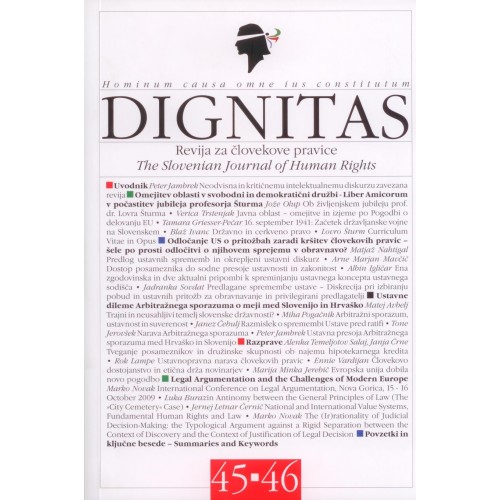The (Ir)rationality of Judicial Decision-Making: the Typological Argument against a Rigid Separation between the Context of Discovery and the Context of Justification of Legal Decision
Izvleček
The article deals with the problem of separation between the
context of discovery and the context of justification of legal decisions,
which is a basic theme in legal argumentation theory. First,
the context of discovery focuses on the process of reaching a decision,
which comprises the following major steps: (a) identifying
the facts of the case; (b) discovering the relevant legal norms; and
(c) deciding whether the established facts of the case can be subsumed
under legal norms, with this leading to a legal decision at
the conclusion of the decision-making process. Second, the context
of justification is, however, only concerned with justification
of the legal decision through the application of relevant legal arguments.
Therefore, the majority of legal theorists interested in
legal argumentation theory support the position that the mentioned
two contexts are rigidly separated, in the framework of which
the process of discovery is mainly studied by psychologists while
the process of justification is the only area that should be relevant
for legal argumentation theory. I oppose such a rigid separation
between the two contexts and view it as a position that is too idealist.
Instead, I support a more realistic position of their moderate
separation, whereby I recognise the importance of the discovery
context while still insisting on the major relevance of the justification
context.
References

This work is licensed under a Creative Commons Attribution-NonCommercial-NoDerivatives 4.0 International License.
Authors who publish with this journal agree to the following terms:
- Authors are confirming that they are the authors of the submitting article, which will be published (print and online) in journal Dignitas by Nova univerza, Fakulteta za slovenske in mednarodne študije. Author’s name will be evident in the article in journal. All decisions regarding layout and distribution of the work are in hands of the publisher.
- Authors guarantee that the work is their own original creation and does not infringe any statutory or common-law copyright or any proprietary right of any third party. In case of claims by third parties, authors commit their self to defend the interests of the publisher, and shall cover any potential costs.
- Authors retain copyright and grant the journal right of first publication with the work simultaneously licensed under a
Attribution-NonCommercial-NoDerivatives 4.0 International (CC BY-NC-ND 4.0)
that allows others to share the work with an acknowledgement of the work's authorship and initial publication in this journal. - Authors are able to enter into separate, additional contractual arrangements for the non-exclusive distribution of the journal's published version of the work (e.g., post it to an institutional repository or publish it in a book), with an acknowledgement of its initial publication in this journal.
- Authors are permitted and encouraged to post their work online (e.g., in institutional repositories or on their website) prior to and during the submission process, as it can lead to productive exchanges, as well as earlier and greater citation of published work.

